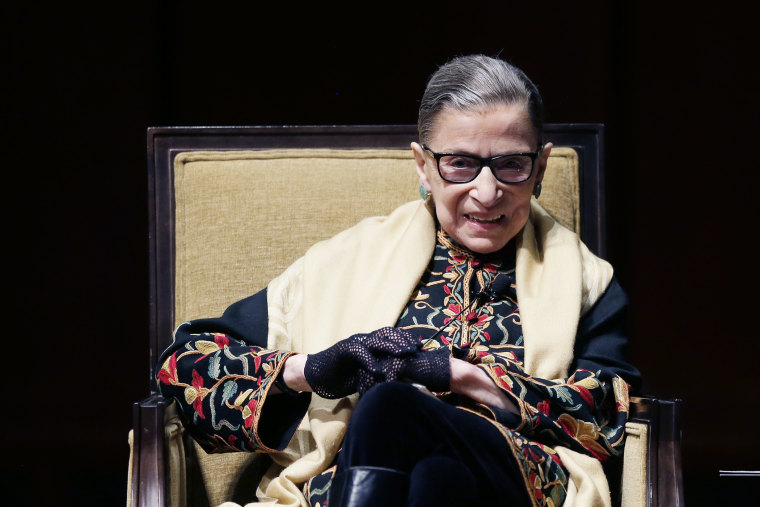She’s a civil rights icon, the fiery voice of the liberal wing of the court. But as msnbc’s rare interview with Supreme Court Justice Ruth Bader Ginsburg shows, the Notorious RBG is more than just a jurist. She’s also a woman who has lived the change she’s advocated in the world -- overcoming the slammed doors of sexism, forming half of a before-its-time egalitarian marriage and defying characterizations of her as elderly and frail.
And yes, at age 81, she can do 20 pushups.
“But we do 10 at a time,” Ginsburg confirmed modestly with a chuckle. “And then I breathe for a bit and do the second set.
Related: Ginsburg on abortion, race and the broken Congress
She still pulls all nighters in feverish bursts of productivity -- in fact, she told msnbc, that was part of why she famously nodded off at the last State of the Union.
“I thought to myself, ‘Don’t stay up all night,’” she told msnbc. “But then my pen was hot.”
At the traditional pre-State of the Union dinner of the Justices, Ginsburg said she told herself, “Just drink sparkling water, no wine. But the dinner was so good. And it needed to be complemented.” And whereas her now-retired colleague Justice David Souter “would give me a pinch,” Ginsburg laughed, “Now my colleagues – I think they’re more reluctant.”
Ginsburg is well aware of the legions of women who admire her -- even if she isn’t thrilled about people getting tattoos of her face. “I thought it was a joke. I thought it was something you pasted onto your arm. But I’m a little distressed that people are really doing that,” she said.
On a more serious note, she had a message for her youthful fans. “ I would like them to have the enthusiasm that we had in the ’70s – determining that the law should catch up to the changes that have occurred in society, changes in the way people whatever, the realization that no one should be held back, boy or girl – because of gender, artificial gender barriers,” she said. “That everyone should be – in the words of a wonderful song that Ms. Magazine popularized, everyone should be free to be you and me.”
Ginsburg’s own life has defied gender conventions. She admitted to not having cooked a meal since 1980. Her husband, the late Martin Ginsburg, a law professor and tax lawyer, was such a famously good cook -- and the Justice such a poor one -- that their daughter eventually “decided that Mommy should be phased out of the kitchen altogether,” Ginsburg recalled.
Since her husband’s death in 2010, Ginsburg said their daughter had taken up the task: “My daughter feels responsibility for seeing that her mother is well-fed. ‘Cause she comes once a month. She spends all day cooking. She fills my freezer with food. Then we do something nice together in the evening. And then she comes back a month later,” Ginsburg said.
Ginsburg’s marriage was about more than who was in the kitchen: She has often said her husband’s championing of her career was pivotal to her success. And in her conversation with msnbc, she called him her "best friend."
“Marty was an extraordinary person. Of all the boys I had dated, he was the only one who really cared that I had a brain,” Ginsburg said. “And he was always – well, making me feel that I was better than I thought I was.”
When the two were enrolled at Harvard Law School -- where Ginsburg was one of only nine women, she said, “He told everybody, all of his friends, and he was one year ahead of me. His wife was gonna be on the Law Review. And people looked at me and said, ‘She doesn’t look like the type that’s gonna be on the Law Review,’ whatever that type was.”
Long before mass-media conversations about “having it all” and the rise of the female breadwinner, there were the Ginsburgs, who married in the 1950s. “In the course of a marriage, one accommodates the other,” Ginsburg said. “So, for example, when Marty was intent on becoming a partner in a New York law firm in five years, during that time, I was the major caretaker of our home and then child. But when I started up the ACLU Women’s Rights Project, Marty realized how important that work was.”
Even after decades on the bench, Ginsburg said she still experiences sexism. But, she said, “Less than I once did. Once it happened all the time that I would say something and there was no response. And then a man would say the same thing and people would say, ‘Good idea.’” She laughed. “That happens much less today.”
She added, “I would contrast an earlier period in my life, when I just accepted discrimination as that’s the way things are. Nothing I can do about it.”
And now? “I try to teach through my opinions, through my speeches, how wrong it is to judge people on the basis of what they look like, color of their skin, whether they’re men or women,” Ginsburg said.
Asked what she had ever changed her mind about, Ginsburg said she rarely looks back.
“I got very good advice when I became a judge of the D.C. circuit,” she said. “My senior colleague, said, ‘Ruth, I’m gonna tell you something about the business of judging. You work very hard on each case. But when it’s over, don’t look back. Don’t worry about things that are over and done. It’s not productive to do that. Instead, go onto the next case and give it your all.’ So nothing leaps immediately to my mind that I would have done differently.
“But I don’t dwell on that kind of question," Ginsburg said. "I really concentrate on what’s on my plate at the moment and do the very best I can.”
